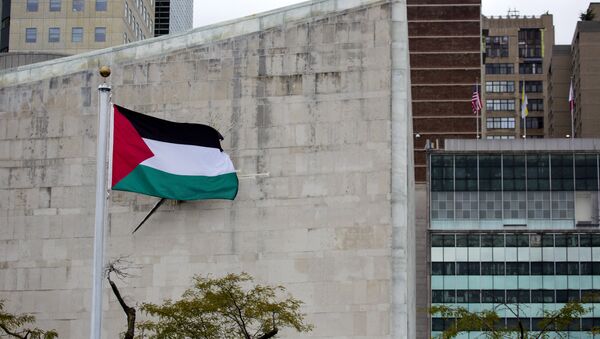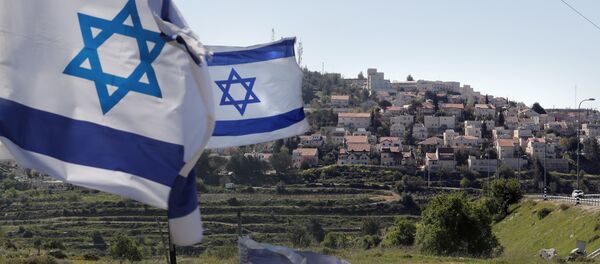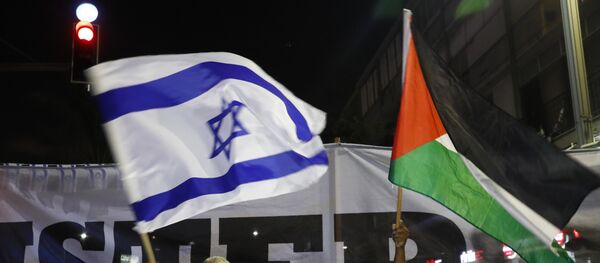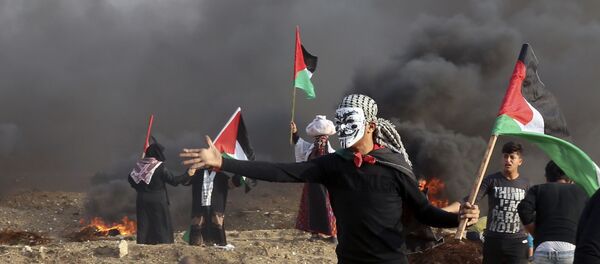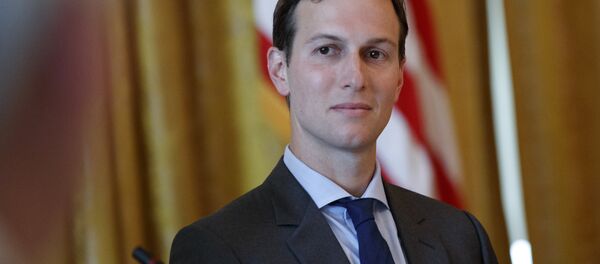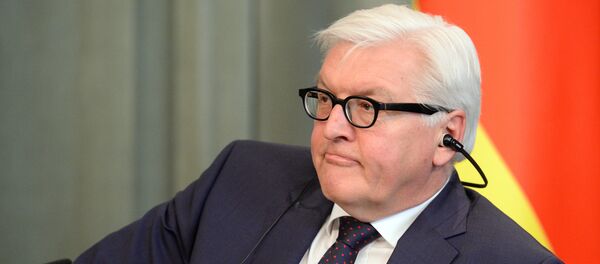MEDays Forum is considered a strategic meeting for global players involved in the geostrategic, political, economic and social spheres of southern countries and more specifically the Mediterranean, African and Arab regions.
On the sidelines of the annual international forum MEDays, Sputnik’s correspondent talked to Ambassador Husam Zomlot, head of the Palestinian Mission to the UK, about the history of the Israeli–Palestinian conflict, the role of the US as the mediator for the peace process, Kushner plan, and future prospects of the region.
Sputnik: The United States recognised Jerusalem as the capital of the Jewish State in December 2017, moved the American Embassy to Jerusalem in 2018, has accepted the Golan as Israeli territory, and cut assistance to the UN Relief and Works Agency for Palestine Refugees. Given all these facts, in your view, is America capable of acting as a mediator in the settlement of the Israeli-Palestinian conflict?
Husam Zomlot: America is definitely incapable and has discredited itself of being a mediator. Starting with the Trump administration that has really made it a historic, religious task for the team of Trump to actually kill the prospects of a two-state solution all the way for the Greater Israel project, embrace fully the illegal settlement expansion and actually as prior to acts of the US Ambassador to Israel, David Friedman, is also starting a religious war. If you remember, anybody who wants to know the standing of the US needs to remember that image of Ambassador Friedman underneath the Old City of Jerusalem with a big hammer opening a tunnel and saying that that tunnel is a tunnel that has to do with the historic presence of the Jewish people in Jerusalem. And therefore, this administration is not only damaging in the political, economic, security sense, but is actually damaging in terms of embracing those religious fanatics who want to see the conflict not in a political and legal order to be resolved, but a conflict between gods that could never be resolved. So, you just need to follow their statements and what they say and you will realise that they are not only discredited but they are part of the problem now, they are an integral part of the conflict and they are even pushing the conflict to become a much more dangerous one which we are pushing against and trying to stop.
However, the US has always been unable to play the role of the neutral mediator, not just during Trump times. I mean from the time of the advent of the peace process in Oslo which was the Clinton administration through to the George W Bush administration and Obama, the US has been unable to actually play that role for simple reasons.
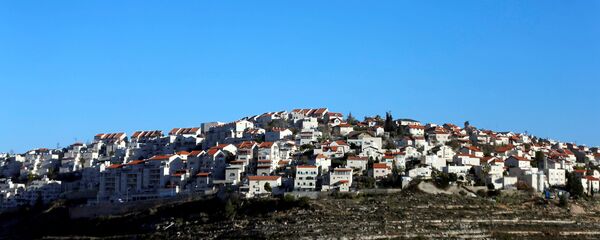
The first, in the US Israel is not a foreign policy issue, it is a domestic issue. And it has always brought itself because of the Israel lobby, because of the American definitions since Kissinger that it is in the best interest of the US to have Israel as a major strategic security asset against the Arab world because of the arms industry, because of the evangelical movement and the religious side. There are many factors in the US that would prevent it from doing what it wants. The US has always wanted to be a mediator. The US has wanted to implement the two-state solution before Trump, definitely. Obama wanted to implement the two-state solution. Clinton wanted to implement the two-state solution. The first president who said two-state sovereign was George W Bush. But all of them failed because of the domestic internal dynamics in the US. So, from the very early on, the model was flawed. Resolving an issue like Israel-Palestine, the Arab-Israeli conflict required international mediation rather than US mediation. That is why Madrid peace process started this whole discussion and it was supposed to be in the Madrid Peace Conference in 1991, it was supposed to be the US, the Soviet Union at that time, the European Union and the United Nations. It was supposed to be a consortium of the major representatives of the world that would bring the will of the international community to implement the will of the international system, i.e. international resolutions in the Security Council and what have you.
The US has always insisted, fought hard to monopolise the process, to make sure that it excludes all other players and this was a major problem. And if you go back to the history of conflict resolutions worldwide, you will find out that it is almost always… not almost, it is always the case that conflicts are resolved via international intervention – not via one player, one mediator. We were made the exception. The Palestinians were made the only exception whereby it was only the US to resolve the situation. So, by way of closing this discussion as much as the Trump administration has inflicted so much damage to the prospects of the peace process has inflicted damage on the international system that governs the Palestinian issue. It provides an opportunity. The opportunity is really to break away from the last 27 years of a sole mediation by the US over a peace process that is only brokered by the US, to break away from that and to start the process of really creating an international mediation process that could actually be meaningful and provide us and deliver us where we want to go.
Sputnik: Was there a point of no return in US actions in the framework of the Palestinian-Israeli conflict?
Husam Zomlot: They have reached it already.
Sputnik: Or something maybe the core that after that we can say that there is no return point?
Husam Zomlot: The major policy line between us and the US, between us and the rest of the world, not only the US, is that we, the Palestinians, have been required by the international community to adopt and accept the two-state solution. That discussion was happening in the 70s and the 80s. Before that, we, the Palestinians, were demanding one state, democratic state, equal rights for all. So the two-state solution was never a Palestinian demand. The two-state solution was a Palestinian concession to international demand. So, it was an international demand conceded by the Palestinians primarily to align ourselves through the international legitimacy, to become part of the international community and to give the international system to intervene in resolving and implementing its own vision.
So the international vision of the two-state solution was adopted by us so that the international community could implement it. That was the idea. And I am saying this to say that since then our frame-line is: “fine, you want us to accept the international UN Security Council Resolutions 242, 338? You want us to recognise the state of Israel? Fine, we will do all that but you must also be very serious about your own demands, about your own resolutions”. So the red line for us is fully endorsing two things: two states on the 1967 borders, East Jerusalem is the capital of the state of Palestine that will live in peace and security with the state of Israel; both will be recognised mutually and by the international community and with a fair and just resolution to the issue of Palestine refugees according to the international resolution 194. These were the two pillars.
The US has been endorsing this policy over the years until Trump came and publicly and discreetly as well changed that policy. The US is no longer endorsing the two-state solution of 1967. We don’t know what is in the Trump’s ultimate deal but we know what’s not in it. We know what’s not in the deal. The deal does not include Jerusalem: these are the words of Trump himself. The deal does not include Jerusalem because he said: “Jerusalem is off the table”. The deal does not include the refugees because they have cut all funding to UNHCR, they wanted to redefine the definition of who is a refugee in a very illegal, non-international way. The deal does not include borders and settlements because so far they have not even come to criticise the very illegal act of building settlements. And therefore, they have already crossed our redline.
Sputnik: In your view, is the two-state solution still possible to be implemented?
Husam Zomlot: Yes, the two-state solution is still possible. But it requires something that we have to bear and it is not there now, which is consequences and pressure. Israel will just not implement the two-state solution because it wants to or because it is a nice country. Israel will only implement the two-state solution because it has to. And so far, the situation did not really push Israel enough towards implementing the international will. The US was supposed to be that pressure point on Israel to actually give in and quit in its occupation of the West Bank, Gaza, and East Jerusalem and implement the international resolution. So the question now is how do we create this leverage? How do we create these consequences? The answer is very clear.
Number one, we need to create international consequences for every act that Israel does, including the attacks that it is doing as we speak now on Gaza. I mean, you cannot just go and kill people with impunity. And even the wars have rules. You have to respect the rules. You cannot just send a five-ton rocket into a household, a family home, killing all the children and women and father and grandfather. You can’t do this, this is a war crime. And also there will have to be consequences on the illegal settlement expansion. Only two days ago the European Court of Justice, the Highest European Court ruled that all illegal settlements’ produce must be labelled and so it gives the consumers the ability to actually decide whether they want to consume it or not. That is a good step in the right direction – to label illegal settlements’ products – but it is not enough. It is not just the responsibility of the consumers, it is also the responsibility of states, i.e. the states must ban settlements’ products from entering their markets. Also, we have been seeking international recognition since 2011 at least. We want to be recognised in the United Nations.
We got to be an observer member state if you remember in 2012 via the General Assembly. There are many countries in this world including China, Russia, and more than 130 countries that recognise fully the state of Palestine. The rest of the world, primarily Western Europe, needs to follow suit, needs to recognise the state of Palestine because this is the best formula for actually proving that the international community means a two-state solution. So, there are a few steps that could be taken. That actually would deliver a very clear message: a) to the Palestinian people that the international community is serious about the two-state solution and inject hope in the hearts of our people, but b) to the Israeli settlers and to all those who want to go the maximalist approach and snatch whatever land there is; to the Israeli settlers there will be a message of this incentive like the world will not allow for this to happen.
So there are many steps that the world can take that will actually start the process of rolling back Israel’s occupation and allowing for a genuine, meaningful peace process that will implement the two-state solution. The world did not do that. We, Palestinians, were engaged in much resistance, many popular acts. And if you remember, for the last many years of protesting against the illegal wall built in our territory in Palestine against the settlements. But our acts need to continue, our popular resistance need to continue but it must be coupled with international sanctions.
Sputnik: How necessary or important is a third party in resolving the Israeli-Palestinian conflict, be it the United States or any other country? You have mentioned that the United States is impossible to [provide] help but, in general, could this conflict be resolved without a third side, without the help from other countries?
Husam Zomlot: There are a few approaches. There is the approach that this conflict can only be resolved via the two parties. But this model was tried during Oslo. It was tried for a long time. And because of the vast asymmetry, the imbalance between the two sides – it is a method that was tried and failed – then it was ought to fail because, in a purely bilateral process, Israel would always want to dictate rather than negotiate. And this is what has been happening for the last 27-28 years. For Israel, the two-state solution, our recognition of Israel on the 1967 borders, for Israel was like “what is mine is mine and what is yours is negotiable”. So, for Israel, it wasn’t a process to implement the two-state solution that was recognised by the international community, for Israel it was a process to actually take more. That is for the centre-left Israelis like the Labour [Party], but the right-wing Israelis like Netanyahu, it is not even “what is mine is mine and what is yours is negotiable”, no, “what is mine is mine and what is yours is also mine”. So, the bilateral process does not succeed. What really it is a combination of…
In the end, a peace process is a function of the balance of power. It is not about how convincing you are to your opponent. It is not about how nice you are, no, it is a balance of power. And to balance it, you need an internal situation that makes the occupation very costly. And I think we have moved, shifted over the last 10-15 years whereby we have realised that we can actually make the occupation costly in a non-violent way. And this has been very effective – non-violent way via our popular movement on the ground both in the West Bank, Jerusalem, and Gaza. Remember, last year there were tens of thousands of our people in Jerusalem protesting the electronic gates that Netanyahu wanted to erect in the Old City and preventing people from praying in the Al-Aqsa Mosque.
There were tens of thousands of people in Jerusalem, our Palestinian people in Jerusalem, that really pushed Netanyahu and his government to actually remove these gates. So, popular resistance is very important. We need to keep doing it in a non-violent, peaceful way as happening in the West Bank, all over the West Bank, all over the settlements, in villages like Bil’in, Nelean, Kafr Qaddum, if you follow the news on a weekly basis. Also the March of Return around Gaza, the peaceful March of Return and the very cruel way Israel is dealing with it and shooting many settlers. And this coupled with our success in the last few years to actually bring about an international legal commitment to deal with the settlements’ products in a differentiated way as the ruling of the European Court [of Justice] only two days ago.
We need to continue that but that is also not enough on its own. We need international direct mediation. So, what we need is an international peace process rather than the US peace process. We need at the table Russia. We need at the table China. We need at the table Brazil. We need at the table South Africa. We need at the table Europe, definitely. Europe is a big stakeholder in the process. It is the biggest trading partner with Israel and it is the biggest donor to the Palestinians and it is bordering our borders – between Palestine and Cyprus, there is only 40 kilometres sea-wise. There are many stakeholders who are way more affected by us positively or negatively than the US. And Russia now has a key role in the region, so are the many other actors.
Again, this brings me to the major point. Trump is a big crisis to us all and the biggest damage of Trump is his attack on our international system because Palestine is just at the top of the needle. But he is attacking our ability to cooperate, our ability to deliberate together as an international family and come up with resolutions and implement them. But that damage has been done, including on us Palestinians. But he is also an opportunity because no longer the US is the only hegemony in the region. In the old days, the US was almost the sole superpower since the 90s. But now Trump has really allowed for new actors to come on the stage. And Trump has really withdrawn from the Middle East and withdrawn from many other regions. And it is creating a lot of regional dynamics worldwide, not only in the Middle East, in the Middle East, in Europe and elsewhere, regional dynamics for people to come together and find ways to resolve their issues without the United States of America.
Sputnik: Following your statement, nevertheless, the United States not long ago offered so-called “money against the territories” or “Kushner Plan” that proposed to inject more than $50 billion over a ten-year period into Palestine [and its neighbouring economies to "improve services to citizens, pursue reforms and create jobs"] if Palestine signs the Deal of the Century. We can’t say that the US did nothing for the Palestinians. However, my question is how do you see this move, this action? How ethical is it? What was good? What was bad? How that should be implemented if so? What do you think about this?
Husam Zomlot: This whole Kushner economic plan.
Sputnik: The core of the idea was good.
Husam Zomlot: No, the idea was not good. The only side of Trump’s ultimate deal that was revealed was the economic plan. That was the only side that was revealed which tells you all that you need to know about this so-called ultimate deal. Why? Because for this group, for this team, for the Trump team, the Palestinians, the people of Palestine, are not a political issue – we are a humanitarian issue, an economic issue, a security issue but not political. If you follow what they have been doing, it takes you all the way to the Kushner workshop in Manama, in Bahrein. Why would they close our embassy, our mission in Washington, which I used to had, I was the ambassador there. Why would they do that? Because they do not want to recognise, they want to de-recognise the Palestinian people as a nation us political collective rights, with the right of self-determination on the top of these sites.
And our mission, our diplomatic mission in Washington with our flag flying was the address of that collective representation and those collective rights that were recognised by the previous administrations, particularly Clinton. And our office was opened as a diplomatic mission since the early 90s. Why would they close the US Consulate General that has been there in Jerusalem that has been there since 1844? Do you know how many years that is? That is long before the state of Israel was established, long before Israel was born. And the US Consulate General in Jerusalem was effectively the US Embassy to Palestine. So it was the key point of contact between the US government representatives and Palestinian people. Why would they close it after all these years? Because for them Netanyahu has convinced them that the Palestinian issue is an internal issue within Israel. Now after they closed it – they have shattered it down – they moved it to the US Embassy in Israel. So they closed the Consulate General which is the US Embassy to Palestine and they moved it to the Embassy in Israel and they call it Palestinian Affairs. What does it mean? It means we, the Palestinians, are an affair within Israel, we are an issue within Israel.
Back to your original question: the Kushner Workshop is exactly what you need to know. These guys think we have needs, not rights. We have what? We have needs, not rights. We are going to be thrown some pieces of bread and that will make us happy and satisfied. It seems they have not studied the lesson of history very well over the years. That is number one.
Number two. It is also about how childish this whole exercise was. I mean you come up and you offer $50 billion to the Palestinians over 10 years. If you do the calculations – I am not going to go into details – but some of it will go to neighbouring Arab countries, primarily to help them kill the issue of the refugees. Some of it will go to us, the Palestinians, over 10 year period. And some of it is not grants – it is loans, so we would be enduring a great deal of interest. These are business people and they are bankruptcy lawyers: the Kushner team, Friedman and Greenblatt, they come from the real estate business in Europe. So they want us to be heavily indebted.
But if you do the calculations and you take away all the money that goes somewhere else, you will come up with the conclusion that actually Kushner promises us to give us less than what we are receiving already from the international community. But here is the difference. Kushner wants to destroy, dismantle the existing international donor mechanisms namely the Ad Hoc Liaison Committee (AHLC), which is chaired by Norway by the way because of the Oslo peace process. And the Arab World contributes to the AHLC. Russia contributes [to it as well]. The European Union is the biggest donor. So Kushner, the clever guy, the clever boy, wants to go to that workshop, dismantle the AHLC and create his own, take the same money, but he is the one who is going to be the tab that will decide to give us the money or not. But the difference is the AHLC was the product of an international agreement that this is for the two-state solution, this is for the international resolutions, this is within the political framework. His new mechanism is without any political framework, with no endorsement of the two-state solution.
So, the Bahrein Workshop was simply all what you needed to know about who are these guys, what they want to do and their real thinking. Their thinking is that our rights could be bought: good money, that we are up for sale, and that it is all about money. And that’s why we rejected it, we boycotted it and we did not go on. That is why it tends to be a farce.
Sputnik: Sure, I absolutely agree. Then how can we ensure the relaunch of a peace process in a pragmatic way? What should be done to restart a peace process between the two countries, to restart negotiations?
Husam Zomlot: We need three things. The first, we need an Israeli public that really wants to end this issue and end the conflict and create a new situation – we don’t have that. The Israeli public is very comfortable, that is the fact. You go to Tel Aviv, it is a booming city, and the Israeli public, in general, has been electing leaders like Netanyahu for so many years because they want to keep their status quo, they are very comfortable. If you go and ask the 700,000 illegal settlers, now 750,000, if you go and ask them why are they in the illegal settlements occupying West Bank and East Jerusalem? Why are they there? According to many Israeli studies, the majority of them, more than 70%, would answer that they are there for economic and financial reasons because it is much cheaper to own a villa in an illegal stolen land. And they have many government tax incentives to actually go there and occupy the land. So the government promotes it.
So the Israeli public, in general, be it those who live in Tel Aviv, who are very comfortable in their life, or be it those who live in the occupied territories protected by the Israeli army, are comfortable. They have no sense of crisis, they have no sense of urgency, and they will always behave in a way that would want to ensure that they have the cake and eat it too. You know, that English expression “to have the cake and eat it too” means that you want to keep…
We need to change that dynamic. And I think we and the world have a lot to do that: to create a non-violent, peaceful, bloodless sense of crisis in Israel. What do I mean by a bloodless? Violence does not work in our countries, we have tried it for a long time – it is very counterproductive, it is ineffective and it doesn’t get us where we want to go. But we need to create that sense of crisis in Israel peacefully via our mass movement and we need to do our protest much more. And we need to make sure that that protest brings real moral, legal, security and economic pressure on Israel and the settlements. We are doing that at a very severe cost: hundreds of people have lost their lives recently because of peaceful demonstrations. You saw around the fences of Gaza how many people are sniped out on a weekly basis. But this brings me to the second, we need to couple this and to create that peaceful social crisis, there must be international sanctions. There must be international sanctions. That is why we went to the UN. That is why we sought UN membership. That’s why we joined the International Criminal Court. That is why we wanted to leverage and to use the international mechanisms to couple our efforts on the ground and to create that sense of crisis in Israel. Without it, any process is meaningless and will not go anywhere.
Number two. We need the support of the region. We need the support of the Arab World. We need the support of our immediate neighbours. And we have it. And we have it also in the Arab Peace Initiative that has defined very clearly the Arab and the regional acceptance of Israel. It tended to be an Islamic peace initiative with 57 Islamic states approving it: should Israel end its occupation of Arab land, Palestinian land, that has begun in 1967 borders and establish peaceful relationship with the state of Palestine and resolve all our standing issues, including the issue of refugees – the Arab and Islamic world would immediately normalise relations with Israel, which was issued in 2002. So, we have regional tact, a regional understanding of what should happen. However, we need a bit more support, we really need more understanding that we need to make the situation ripe for a peace process.
Thirdly and lastly, it is the international community. It is the international system. It is the international mediation. And it is the international acts rather than verbal discourse. And there is so much that has been happening there. This is not the best moment for peacemaking, it isn’t, unfortunately. It might be one of the lowest points in terms of odds for peace.
But I was in Berlin only a few days ago to commemorate, to celebrate the 30th anniversary of the fall of the Berlin Wall. And there, they told me: nobody even in Berlin expected the fall of the wall and the end of the Cold War. It just came crumbling instantly, without any prior knowledge or assessment or forecast. I was in South Africa and the same message came to me. I have been telling the point of the release of Mandela from the prison. Everybody thought it was the bleakest and the last moment… things are very dark. So, you never know when our wall would fall because we have a bigger and higher wall in Palestine built by Israel. You never know when our wall will fall, you never know when the Israeli public will come to realise that what they are doing is not sustainable. It is not sustainable. Then there will come a point when they realise that they cannot exist in the region and have a normal relationship in the region at the expense of another nation.
When they will realise that all what they borrow from America in terms of money and military and all, is not going to be there forever. And when they will realise that the only way for them is to actually accept the concept of sharing, accept the very concept of a win-win. You cannot have it all. This is not going to happen. And you cannot defeat a nation via a military. I mean military defeat military but militaries cannot defeat mothers and fathers, and lawyers and taxi drivers… And Israel has been trying to actually quash our nation for the last hundred years, hundred years, nonstop. Only a few days ago we commemorated the 15th anniversary of the passing away of Yasser Arafat.
They surrounded Yasser Arafat in front of the world because they thought Yasser Arafat as our leader was the problem. Okay. Yasser Arafat is not with us but the people of Palestine are still there and they elected their leaders. But we need to help the Israeli public reach that moment. We can only help the Israeli public reach that moment by putting pressure. And that pressure is not sufficient until now, it needs to increase.
Ambassador Husam Zomlot is the Head of the Palestinian Mission to the United Kingdom. He also serves as Strategic Affairs Advisor to the Palestinian President. Prior to his appointment to the UK, Dr Zomlot served as Ambassador to the United States. His previous official roles include serving as Ambassador–at-large for the Palestinian Presidency and Director of the Fatah Foreign Relations Commission.
